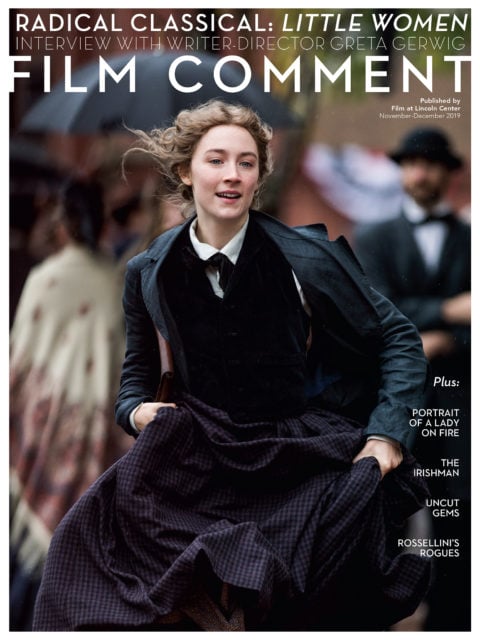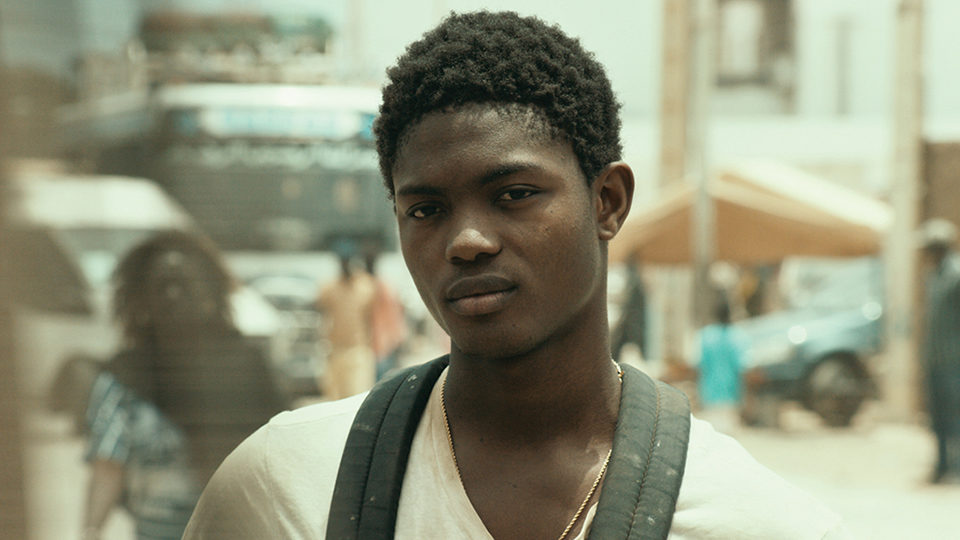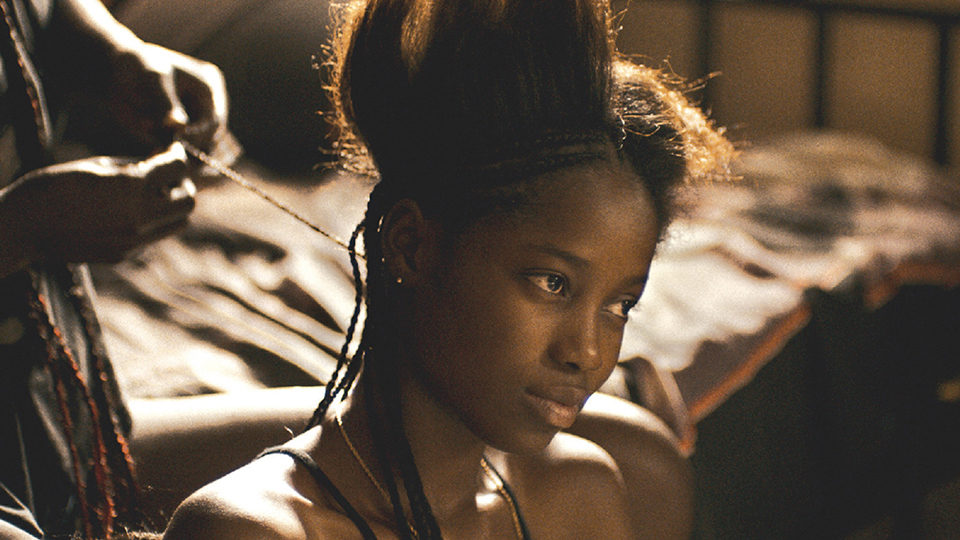
Digital Dust: Fatima Al Qadiri
Mati Diop’s first feature film, Atlantics, is firmly rooted in the earthbound reality of present-day Dakar, Senegal. Its characters, portrayed by first-time actors, are precisely drawn, and their homes are filled with chatter and the tinny strains of pop songs playing from cell phone speakers. The exploitative labor conditions on the building site of a massive high-rise sets the film’s narrative in motion. But it’s also a deeply surreal and haunted film: its young characters navigate love and the refugee crisis by conjuring and physically embodying ghosts.

This sense of “bothness,” of the ancient and otherworldly existing within a hyper-present tense, is captured and enhanced by the film’s score, composed by Kuwaiti musician Fatima Al Qadiri, who was born in Senegal. Al Qadiri is a prolific and multifaceted artist, deftly imbuing electronic music with sharp political commentary. Her narratively driven solo albums and EPs include 2016’s Brute, a dark pastiche of the sounds of protest and state repression, and 2014’s Asiatisch, a trippy and barbed electronic travelogue through aural stereotypes of China. She’s also part of the Gulf artist collective GCC, whose multimedia projects and installations slyly address the aesthetics of Gulf Futurism in a changing region.
For Atlantics, Al Qadiri has composed an electronic symphony of rolling waves of synths. Her signature digital celestial choir, a synthesis of artificial voices from the uncanny valley, comes from within the ambient soundscapes and also floats above and outside it. By turns unsettlingly dissonant and infectiously melodic, it’s the rare score that fully reflects the world of the film while also asserting its own unique complex voice—fitting for a cinema that exists simultaneously in two realms.

Atlantics (Mati Diop, 2019). Courtesy of Trigon Film
There’s a lot in this film that resonates closely with the concerns of your own art.
Definitely, and Mati knew that. That was the beautiful thing [about] working with her, also being a woman of color. Being Muslim, being exposed to Muslim culture, there were a lot of things that we didn’t need to explain to each other. Just like, oh yeah, you get it. That was so cool, considering the language barri- er as well. It was really nice to have this relatable subject environmentally, spiritually, vibe-wise.
How were you defining the music’s relationship to the characters?
Mati gave me the moods for each of the scenes. She expressed the feelings of the characters, what she was trying to get across. So I had her guidance, as well as my own interpretation. For instance, for the opening scene of Souleiman on the truck, where he knows that he might potentially die later that night on his sea journey, Mati wanted me to figure out a way to communicate that. There is despair mixed with hope, mixed with fear, mixed with a feeling of destiny, which is part of Islam. You can’t be Muslim if you don’t believe in destiny. There is an expression, kitabak maktoob, which means “your book has already been written.” I feel like there’s a darkness in that scene but also hope: he’s doing it in order to get to Europe as part of this dream of having a better life. But it’s terrifying: he’s looking at the sea, seeing people swimming, fishing. The boys around him are all singing these prayers for the safety of their journey, asking God for protection. So it’s deeply sad, and it’s kind of an omen at the beginning of the film.
And your music is really the way we receive that omen.
I think that’s the only time I used—I mean, they’re all plug-ins, they’re all virtual instruments, but there, it’s an African guitaret that’s from the late ’70s. Basically, I wanted it to feel like a wash- ing machine, you know? There’s kind of this guitar sound going over and over and over like the wheel of the truck. And it’s kind of making him queasy with fear, and then this bass synth washes over him like it’s the sea.

Atlantics (Mati Diop, 2019). Courtesy of Trigon Film
In many scenes, the score emerges pretty organically from the environment. It often sounded like it was literally coming out of the water.
Mati would be extremely happy to hear you say this. When I first met her in Paris, she was like, “I want the music to come out of the depths. I want the music to come from where the boys are in the sea.” She kept drilling this into me while I was writing, even before I started writing. If I could just summarize her musical vision from the film, that’s it. And she was very present in the sound mix. Even with something like the volume of the tracks in relation to the characters.
I kept thinking of the sirens from The Odyssey—music that feels beautiful and seductive and dangerous.
I wanted to make themes in the film. One of the repeating themes was this one called Qasida, the possession theme. I wanted this theme to sound ancient, like it was coming from the Middle Ages, because the idea of possession and Jinn are ancient ideas. So that theme has this low horn that’s almost like a warning horn, and
then you have this melody playing on top. It’s a long process that you see [police detective] Issa struggling through: you see him trying to drive, he’s trying to walk, he’s trying to fight it, something is taking him over, he’s losing track of time. And I wanted to have some sort of sinister and also very irresistible, really pretty melody enveloping him at the same time.
I’m just fascinated by these major warning sounds, whether they’re religious or state emergency noises. Like the call to prayer, the church bell—you know, these amplified calls. Some of them are scary. For instance, when I lived in Brooklyn, once a year during Purim I would hear this crazy noise and I would be like, what the hell is that? It definitely triggered me because during the occupation and invasion of Kuwait and during the war, in all three stages, there were so many air raid sirens and they were terrifying.
Is there something about the refugee story of Atlantics that you can relate to from growing up in Kuwait?
I wouldn’t call mine a refugee story because I didn’t leave Kuwait till years after the occupation and the war. We didn’t flee Kuwait; we were there. I started making music at that time. So there’s one part of my personality where my childhood was just paused. It’s definitely part of my DNA as a composer: my 9-year-old self and this kind of loss, a lost youth. Which was obviously very pertinent in the story of these men in Atlantics, who leave [their country] in their late teens. I always say it’s like surviving an apocalypse: something happens in your brain before and after, and the “during” period is extremely surreal. That was the one thing I feel like I was really able to tap into: this feeling of vulnerability and feeling lost. My music has some level of innocence in it.
I made most of the score in Kuwait, and I make music the way a teenager would. You should see my setup. It’s just like a laptop and a controller keyboard. And I have a couple of shitty monitor speakers. I think lost innocence, a longing for innocence, and longing for childhood and youth is reflected in the lack of a sophisticated setup. And I think that comes through somehow. I enjoy my unpolished sound. It’s not a Western thing. I definitely feel like the apex of Western music—with the exception of things like punk—is orchestras, and polished sound quality, especially in film scoring. And there’s room for another iteration of this that is not crisp, that is not hi-def.
One track early in the film felt more analog, but then it becomes increasingly digital and abstract.
When Mati first spoke to me, she told me that to her, my music was extremely digital. Which is true, it is: everything is made inside of a computer. I don’t really use analog anything. And Dakar feels that way for me, even though after leaving at age two I haven’t been back—there’s something that is digital about Dakar, sound quality–wise. I feel like the music of Senegal, and of West Africa, Central Africa, South Africa, is all like mp3s and recorded on whatever is around. Some of it is with real instruments, some of it is not. So it has that vibe of being neither here nor there. For me, the audio quality of this score is like digital dust. It’s like if you were to touch it would slink through your fingers. There’s something very dusty about it, but I really get that because I come from an insanely dusty place.
Closer Look: Atlantics opens in theaters on November 15, and the soundtrack will be released on the same day.
Sierra Pettengill is a filmmaker and writer based in New York.







